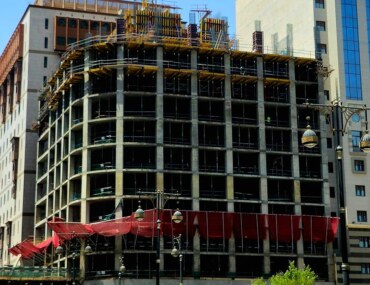In a historic step reflecting Saudi Arabia’s ambitions to diversify its economy and enhance its real estate sector, the Saudi Cabinet approves new property ownership law for foreigners The Saudi Cabinet, led by Crown Prince Mohammed bin Salman, has officially approved the Saudi’s property ownership law for foreigners This law, which will take effect in January 2026, allows non-Saudi nationals to own property in specific designated zones, primarily in Riyadh and Jeddah, with tailored provisions for the holy cities of Makkah and Madinah. This legislation opens the doors for unprecedented foreign investment in Saudi Arabia’s real estate market, aiming to boost the housing supply while safeguarding citizens’ interests.
The announcement follows an extensive public consultation process facilitated by the Ministry of Investment and the Real Estate General Authority (REGA), reflecting the Kingdom’s commitment to transparency and public participation in policy making. This move is expected to significantly transform the landscape of foreign property investment in Saudi Arabia and align with Vision 2030’s goals for economic diversification and sustainable development.
Saudi’s Property Ownership Law for Foreigners Aims

The primary goal of Saudi Arabia’s property ownership law for foreigners is to build a balanced, investment-friendly real estate market that supports economic growth and housing supply. The law offers clear regulations on where and how foreigners can own property, protecting citizens’ interests while reducing speculation. As stated by Minister Majid Al-Hogail, the framework aims to boost foreign direct investment and aligns with the Kingdom’s diversification plans. This approach has helped double the real estate sector’s GDP contribution from 5.9% in 2023 to around 12% in 2024.
Foreign Ownership of Real Estate in Saudi Arabia 2025
The new regulation allows foreign ownership of real estate in specific zones, starting with key cities like Riyadh and Jeddah as strategic investment hubs. In Makkah and Madinah, ownership is restricted to investments through listed real estate companies under strict conditions. The Real Estate General Authority (REGA) is responsible for defining the permitted zones and drafting executive regulations, which will be open for public consultation on the Istitlaa platform within 180 days. This phased approach ensures market stability and transparency for foreign investors.
Conditions for Foreigners to Own Property in Saudi Arabia 2025

Foreign property ownership under the new law comes with several important conditions intended to regulate the market and ensure compliance with national interests:
- Designated Zones: Foreign ownership is limited to geographic areas specified by REGA, currently including Riyadh, Jeddah, and other development-focused economic regions.
- Purpose of Ownership: Properties acquired by foreigners must be for residential use or investment purposes. This prevents misuse of real estate assets and aligns with housing market needs.
- Special Cases for Holy Cities: In Makkah and Madinah, foreign ownership is restricted to investments via Tadawul-listed real estate companies or convertible debt, with foreign ownership capped at 49% to protect the sanctity of these locations.
- Alignment with Premium Residency: The law harmonizes with existing regulations allowing holders of Saudi Arabia’s premium residency program to own property, granting them rights similar to Saudi nationals.
- Registration and Approval: Ownership transactions must be processed through official platforms such as Absher, ensuring proper documentation, transparency, and government oversight.
Benefits of Foreign Property Ownership in Saudi Arabia
The enactment of Saudi’s property ownership law for foreigners brings numerous benefits that extend across economic, social, and market dimensions:
Attracting Foreign Direct Investment (FDI)
Opening up property ownership to foreigners is a strategic move to attract substantial FDI, a cornerstone for economic diversification under Vision 2030. Real estate investments are expected to flow into residential developments, commercial projects, and hospitality, helping to create jobs and stimulate related industries like construction and services.
Supporting Housing Supply and Market Growth
With Saudi Arabia’s population expanding rapidly and urbanization accelerating, foreign investment can significantly contribute to increasing the housing supply, especially in major cities like Riyadh and Jeddah. This helps meet demand and stabilize housing prices, benefiting both residents and investors.
Enhancing Market Regulation and Transparency
The law establishes clear regulatory frameworks and mechanisms, reducing speculative real estate activities and promoting fair market practices. The use of digital platforms like Absher for property ownership management further ensures transparency, efficiency, and legal certainty.
Boosting Economic Diversification and Development
As the real estate sector’s contribution to GDP rose dramatically in recent years, foreign ownership rights will help sustain this growth trajectory. The influx of global capital is expected to enhance economic activities beyond oil, contributing to a diversified and resilient Saudi economy.
Enabling New Investment Opportunities
Foreign investors can leverage ownership rights to invest in both residential and commercial real estate, participating in Saudi Arabia’s ongoing urban and economic transformation. This creates a more attractive environment for expatriates, business professionals, and global funds.
Ownership for Residential Purposes

One of the key provisions of the Saudi’s property ownership law for foreigners is the explicit allowance for foreign nationals to own property for residential purposes in designated zones. This provision enables expatriates, foreign business professionals, and premium residency holders to establish permanent or temporary homes in Saudi Arabia’s rapidly developing cities.
The ability to own residential property is expected to encourage long-term residency and investment, fostering a more diverse and stable community within urban areas. It also aligns with the Kingdom’s goals to attract skilled expatriates and international talent by providing flexible and secure housing options.
Property Ownership for Holders of the Premium Residency
The new law aligns closely with regulations governing holders of Saudi Arabia’s premium residency program, which offers expatriates extended residency rights and privileges. Premium residency holders are entitled to own real estate for both residential and investment purposes, with rights similar to those of Saudi nationals.
This alignment simplifies legal frameworks and encourages affluent foreign residents to invest in the Kingdom’s property market confidently. The premium residency program, combined with enhanced property ownership rights, positions Saudi Arabia as a competitive destination for global investors and professionals.
You Might Also Like: Real Estate and Contracting Week 2025: Building the Future of Saudi SMEs
Property Ownership for Non-Saudis via Absher

To simplify foreign property ownership in Saudi Arabia, all transactions and registrations are managed through the Property Ownership for Non-Saudis via Absher Platform. This digital system streamlines property registration, ownership transfers, and status tracking, while reducing paperwork and speeding up approvals. It reflects the Kingdom’s broader digital transformation goals and its commitment to fostering an investor-friendly environment.
In conclusion, the Saudi’s property ownership law for foreigners marks a pivotal evolution in Saudi Arabia’s real estate and investment landscape. By defining clear zones, conditions, and digital processes for foreign property ownership, the Kingdom is positioning itself as a more open, attractive, and regulated market for international investors. This law supports the government’s Vision 2030 ambitions by encouraging foreign direct investment, boosting housing supply, and fostering sustainable urban development.
We invite investors, expatriates, and real estate enthusiasts to follow the upcoming executive regulations and public consultations on official platforms to fully leverage these new opportunities. For ongoing updates, detailed market insights, and expert advice on Saudi Arabia’s real estate sector, visiting trusted resources such as the Bayut Saudi Arabia blog will keep you informed and empowered in this rapidly evolving market.







